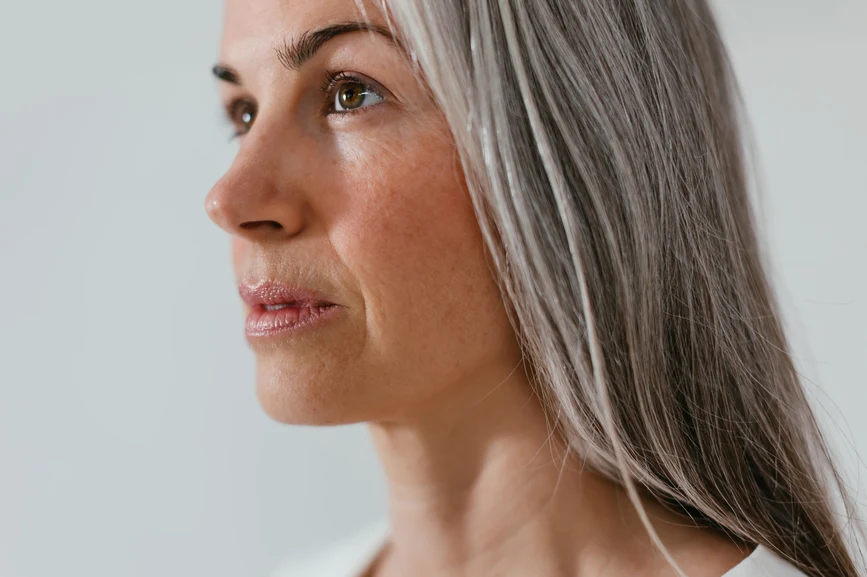What is Menopause?
5 minute read

Are you feeling “off;” not yourself? Are things like your sleep and your moods in constant flux?
You may be wondering if it’s menopause.
What is Menopause?
Menopause is defined as having no menstrual cycle for 12 consecutive months. When you go a complete year without a period, you are officially in menopause.
• As menopause approaches, your ovaries churn out less estrogen, until you are no longer ovulating (or releasing an egg each month).
• No more periods marks a major transition in a woman’s life: the loss of fertility and the end of her childbearing years.
• On average, women in the U.S. reach menopause around age 51. Though less common, it is possible for women in their 40s, or even as young as their 30s to reach menopause.
• Every day, about 6,000 women in the U.S. will reach menopause.
The menopause definition may sound quite simple, yet burning questions persist. A study in the journal Maturitas proved just that when researchers found that lots of us — as many as 65 percent — feel unprepared for menopause. Even so, you have a lot more control than you think, because we’re here to tell you all about it.

Here are some ways to answer the question, “what is menopause?”
• When we were younger, we all got the period talk. We knew what to expect, around when to expect it, and how to deal with it.
• Menopause may be a natural part of aging, yet none of us got the menopause talk, which may leave us scratching our heads and asking: What is menopause, anyway?
• We’re unsure about the process. Are we in? Are we out? Are we there yet? How do we handle it all?
Friends share their stories, but the stories vary from woman to woman. One had nary a hot flash, only realizing her period was gone for good when her boxes of tampons began to crowd her shelves. Another swore off wearing white pants altogether, since she never knew when Aunt Flo would decide to pop in uninvited.
Ralph Waldo Emerson wrote, “Life is a journey.” With all respect to the great poet and philosopher, we’d like to rephrase that to, “Menopause is a journey.” The destination might be the same, but the length of the trip and the way we navigate it differs for each one of us.
The Times, They Are A-Changin’
Your life might feel out of whack. One day you’re feeling just fine and the next, you barely recognize that face staring back at you in the mirror.
Rest assured; you’re not going crazy. Those unpredictable, mixed-up feelings? They’re not your imagination at work. Instead, blame menopause, with fluctuating hormones of estrogen and progesterone bouncing around like a scared mouse, creating many changes in your body — and your life.
In the Beginning, There Was Perimenopause
Wondering at what age menopause starts? The march toward menopause usually begins in your 30s and 40s, years before your periods end for good, when your ovaries go from reliable to fickle, from busy to sluggish. During this time, you may experience changes like irregular periods in your monthly cycles. Your reproductive cycle is preparing to wind down and retire for good. Some hints: Hide-and-seek menstrual cycles, sudden heat surges and other surprises caused by your hormones. Some other tell-tale signs that the change is on its way include weight gain, insomnia and moodiness.
• The menopausal transition (aka Perimenopause) is a gradual process that actually begins years before you toss your tampons. This phase is rarely a “one and done:”
• You can spend between 2 and 10 years in perimenopause until your periods officially come to an end.
• The transition is often bumpy rather than smooth; surprising rather than predictable, with fitful twists and turns along the way.
Pay attention, and you’ll notice how perimenopause makes its presence known with sundry warnings and useful cues:
• Hot flashes. Up to 75 percent of women in the U.S. have them. (Triggers include stress, hot drinks, and caffeine. Go ahead and stick your head in the freezer if you must.)
• Night sweats. They can sabotage your sleep and soak your sheets. (Consider sleeping in the nude or wearing super-light pjs.)
• Heart palpitations. A racing heart can affect up to 25 percent of women during menopause.
• Vaginal dryness. Waning estrogen levels make the tissues thinner and dryer, and can make sex more painful. (Low-dose prescription estrogen preparations or over-the-counter lubricants and moisturizers can help.)
• Weight gain. A sluggish metabolism can pack on extra pounds and distribute weight to your midsection. (Good nutrition and exercise is especially important now.)
• Mood changes. Happy, sad, happy sad. Anxiety, panic attacks and depression (more likely if you’ve suffered with PMS in the past) can hit. (Things like meditation, yoga, deep breathing and exercise can help manage your moods.)
• Erratic periods. Some months your ovaries won’t release an egg, and you’ll skip a period entirely. Other months, your flow will be heavier-or lighter-than-normal or you’ll have unusually long or short cycles. (Keep an extra supply of tampons and pads on hand. Just in case.) These irregular periods can last years in some cases.
• Insomnia. Falling or staying asleep makes it tough to get a good night’s rest. (A cool, dark and quiet room can help.)
• Dry skin. Falling hormone levels can make skin dry, cracked and thin. (Switch to a mild cleanser and richer moisturizer.) In addition to dry skin, menopausal acne and hormone-related breakouts may occur.
• Problems with memory and concentration. (Note-taking can be a good way to remember things.)
• Urinary incontinence. Waning estrogen levels can make the lining of the urethra thinner.
Fertility News Flash: Even though hormone levels are fluctuating during this time, and you might miss a few menstrual cycles, it is still possible to become pregnant, because you might still ovulate (or release an egg) on some months. (Experts advise women to continue to use birth control for at least one full year after their period ends for good.)

Different Strokes for Different Folks
Every woman will experience the menopause transition differently. Some of us will have no symptoms (please, no bragging), while others will experience severe symptoms (so sorry for your discomfort).
Just as symptoms vary, so does the age of menopause’s onset. There’s no surefire way or test to know how old you’ll be when you are officially in menopause. But it’s our good fortune that experts, with their crystal ball of knowledge, can tell us this:
• Many women follow in their mother’s footsteps, reaching menopause around the same age as their mom.
• Smokers may start menopause up to two years earlier than non-smokers.
• Having more than one pregnancy and also breastfeeding may delay menopause by a few years.
• Certain health conditions, chemotherapy, radiation to the pelvic area, or surgery like a hysterectomy can cause early or premature menopause.
You’ve Arrived! Welcome to Postmenopause
You’ve arrived at the stage after menopause.
• No more periods, no more pregnancy worries.
• Due to longer life expectancies, you’ll spend about one-third of your life in this phase.
• After menopause, we’re more vulnerable to things like heart disease and osteoporosis.
• It’s especially important now, more than ever, to eat healthfully, get enough calcium, and keep moving.
• Many of the classic symptoms of menopause, like hot flashes and night sweats, may disappear. But others, like vaginal dryness and hair loss during menopause, could persist because of declining levels of estrogen.
The average woman has an estimated 450 periods in her lifetime.
Yet despite the cramps, the costs and the discomfort, some still mourn the loss of it. But it’s important to realize this: Like everything else in our life’s journey, attitude matters. Studies show those who have had negative beliefs prior to menopause can have more of a challenge during this time.
Our periods may be over, but a new period of possibilities has begun. After menopause, many women feel a sense of renewal, freedom and personal growth. Some even call it a “threshold” and “gateway.”
Along with whales, we are the only other mammals to go through menopause. We, and the other 1.1 billion women who will be in this phase by 2025, have plenty of time to accomplish great things on the other side of our reproductive lifespan.
And that power is just beginning.
Experts agree that for the vast majority of healthy women, supplementing your body's natural hormones is the safest and most effective treatment to ease the vasomotor symptoms of menopause, including hot flashes and night sweats. Head to our product page to check out your options. A menopause-trained doctor will review your choices to make sure you get the right treatment.
Sources
https://my.clevelandclinic.org/health/diseases/15224-menopause-perimenopause-and-postmenopause
https://www.health.harvard.edu/womens-health/dealing-with-the-symptoms-of-menopause
https://www.womenshealth.gov/menopause/menopause-symptoms-and-relief
https://www.aad.org/public/everyday-care/skin-care-secrets/anti-aging/skin-care-during-menopause
https://www.helpingwomenperiod.org/7-amazing-facts-about-periods-that-everyone-needs-to-know/
http://www.menopause.org/docs/default-source/2014/nams-recomm-for-clinical-care
Subscribe
Go ahead, you deserve to